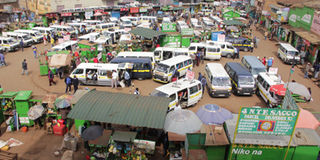Kenya’s matatu drivers are so skilled that any road re-test will be too easy

Matatus at a Nyeri stage on September 18, 2013. Photo/ JOSEPH KANYI
What you need to know:
- I know what I am talking about, having had to teach two chaps and a lass related to me how to drive, each time any of them graduated from a driving school.
- Vehicle inspection has long been a joke in Kenya. If you grease an inspector’s palm, he will go through the motions and pass any vehicle even if it is a coffin on four bald tyres.
Cabinet Secretary Michael Kamau is a man with a passion, and as it turns out, one with compassion as well. For the career public servant who believes in speaking softly and wielding a heavy club, the one thing he would hate most is for carnage on the road to keep growing under his watch.
And that could well happen, considering that already, more than 2,800 people have died in preventable road accidents this year, and we are not even into the festive season when the Grim Reaper goes to work with a relish.
Mr Kamau is not alone in his apprehension that we are slowly losing the battle to save lives through common sense, and so he has resorted to technology.
In a visionary and quite elaborate plan, the Kenya National Transport and Safety Authority (NTSA), a body within the ministry, wants to digitise every aspect of road safety, from the registration of vehicles to the licensing of drivers.
The highlights of the plan include removing the annual inspection of motor vehicles from a disreputable police unit in the ministry and outsourcing it to private firms.
Vehicle inspection has long been a joke in Kenya. If you grease an inspector’s palm, he will go through the motions and pass any vehicle even if it is a coffin on four bald tyres.
The other is the introduction of a smart driving licence which will store information about the driver’s bona fides and his track record.
If the driver has bent the law and been caught, and the record is in his licence, it will be possible to retrieve the information and punish him.
If, for instance, a motorist has been caught driving under the influence and penalised, he will have a history which will work against him should he be caught doing it again.
But somewhere in between lies a problem with this plan whose many impressive features cannot be captured here. The fact is, the NTSA seems to have got things backwards.
Before a PSV or even private vehicle driver is issued with a smart licence, he or she will have to be re-tested. But before even that, he or she will have to be retrained. Who, pray, will do these things?
According to the plan, PSV drivers will be re-tested by National Youth Service personnel. Big deal!
I have news for Mr Kamau and his team. Kenya’s matatu drivers are perhaps the most skilled in the world. They know the traffic rules, being on the road for 15-hour days on average. And except for the dimwits among them who cannot read road signs, they will pass any test.
But they are also the most reckless, uncouth and dangerous motorists in the world. They choose to ignore inconvenient rules, invariably because they want to get somewhere fast, and private motorists are always in the way. Re-testing such chaps will not be the way to restore sanity on the roads.
Secondly, we have not heard any mention of how drivers should be trained in the first place.
Driving schools in Kenya are money-making outfits that seek to train as many as possible in the shortest time possible. As a result, many of their products are half-baked jokers who cannot make a three-point turn or even park a car without bumping into the one in front.
I know what I am talking about, having had to teach two chaps and a lass related to me how to drive, each time any of them graduated from a driving school.
My contention is that the first order of business for the ministry should have been to restructure and standardise the curriculum of driving schools first, and then ensure they do not have their own accommodative examiners who “eat” with them.
How about setting up a pool of examiners, paid by the ministry, and modelled after the Kenya National Examinations Council but with devolved units in every county headquarters?
We have made acquiring a driver’s licence very easy in this country. In other countries, especially in the developed world, getting a licence is a lifetime achievement which is lavishly celebrated.
In Kenya, it takes only about eight lessons for mass killers to be let loose on our roads.





